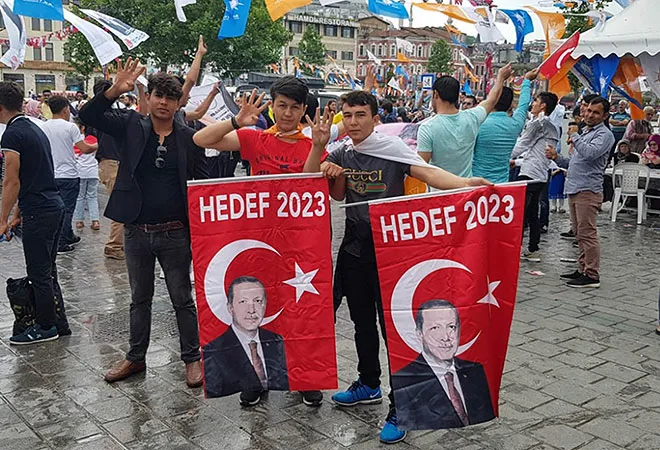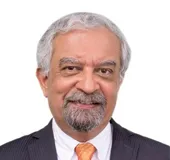-
CENTRES
Progammes & Centres
Location
The upcoming Turkish elections could reconfigure Türkiye’s domestic policy and shape the long-term foreign policy course of this critical middle power

Introduction
The Turkish elections on 14 May 2023 are arguably the most consequential in the country’s modern history because the outcome will determine the long-term nature and course of this critical geopolitical middle power. It will not only have domestic implications but geopolitical ones as well since it is broadly agreed that Türkiye punches above its weight in geopolitical terms because of its strategic geographic location. Therefore, the elections will be closely watched globally in this centenary year of the Republic. The result will determine not only who leads Türkiye but also how it is governed, where its economy is headed, and whether it becomes closer or more distant to the West and the European Union (EU). Will the sectarian Islamist path of the last two decades under Recep Tayyip Erdoğan become irreversible or can Türkiye return, at least partially, to the secular roots planted by Mustafa Kemal Ataturk at the founding of the Republic in 1923?
Türkiye’s trajectory off this secular path has coincided with two decades of Erdoğan’s power during which majoritarian rule has been consolidated with an iron fist and through electoral autocracy.
The republic under Ataturk was modern and aggressively secular and became the beacon of modernity amongst Muslim-majority countries. Türkiye’s trajectory off this secular path has coincided with two decades of Erdoğan’s power during which majoritarian rule has been consolidated with an iron fist and through electoral autocracy. Initially, this was accompanied by poverty reduction through increased social welfare services and benefits and freedom for Muslim women in hijab to pursue higher education and to work in the government, which was previously banned in the Turkish Republic. But in recent times, these benefits have been eclipsed by, amongst other ills, a fast-declining economy, devastating tolls from multiple earthquakes, poor governance and innumerable human rights violations, contributing to an unprecedented and growing unity amongst the Opposition. As a result, there is a chance of real change in May, which was unthinkable till quite recently, with the prospect of defeat for the Adalet ve Kalkinma Partisi (AK Party) and for Erdoğan personally.
The Turkish economy
Turkish citizens have endured a greatly troubled economy for years now and poverty has increased. While statistics cannot adequately demonstrate how gain or pain is distributed, the current state of the economy can partially be summarised by two statistics. Inflation was above 85 percent in 2022. It has since dipped, officially measured at 55 percent year on year in early 2023, but is widely believed to be much higher. The Turkish lira has shed 80 percent of its value over the last five years. In addition, there is a huge, hard-to-bridge, credibility gap with investors partly because of the unpredictable and uneven application of the rule of law. Many credible observers also believe Türkiye’s economy is running on borrowed time.
Devastating earthquakes
The catastrophic economy may not have been enough to unite the Opposition parties—though it may have led to a Cumhuriyet Halk Partisi (CHP) win in parliamentary elections—but the devastating earthquakes in February 2023 may be the straw that broke the camel’s back due to the physical devastation and death toll they caused. The death toll has been even worse than the December 1939 earthquake in Türkiye, with conservative estimates placing it at approximately 50,000 in the first two weeks alone. The memory of these earthquakes, only a little over three months before the elections, will be alive and vivid and can hardly help Erdoğan and the AKP in the elections.
Disaffection with governance
Poor governance can be clearly viewed as being directly responsible for the devastating toll from the recent earthquakes. The government has been culpable for contractor non-compliance with building standards and codes for decades. Construction amnesties, such as the one passed in 2018 just ahead of general elections, allowed registration of unlicensed properties in exchange for a fine. Ensuring compliance and not providing amnesties would have significantly reduced both the physical damage and human toll.
The government has been culpable for contractor non-compliance with building standards and codes for decades.
Poor governance has been increasingly visible in the economy over the years, with even more overarching and widespread consequences due to Erdoğan’s tendency both as Prime Minister and President to go against the economic and financial advice of his senior-most respected economic advisers. The independence and policies of the Central Bank have consistently been severely compromised, with numerous governors leaving or being replaced. This allowed Erdoğan to implement unorthodox low-interest rate policies directly leading to galloping inflation, a plummeting Turkish lira, and a significant reduction in Central Bank reserves due to repeated ineffective attempts to protect the currency. The Statistics Office, which was deemed as one of the most respected institutions in the Organisation for Economic Co-operation and Development (OECD), has been reduced to a mouthpiece of the government, losing credibility both nationally and internationally. Ali Babacan and Mehmet Simsek, both senior members of Erdoğan’s previous economic team, were found credible by investors but they left years ago and the President has failed to woo them back. His recent attempts to signal that Türkiye will follow more conventional free market policies if re-elected have not been convincing nor has he had success in attracting Simsek back to a key future economic role.
Human rights violations
Repeated human rights abuses have compromised much of the judicial system. Hundreds of thousands of Turkish citizens have been jailed, many in pre-trial detention for years without end, particularly after the failed coup attempt in July 2016. Alleged coup plotters, journalists, and Kurdish citizens have borne the brunt.
Unprecedented Opposition unity
There has been growing opposition unity across a very broad political spectrum. Even the pro-Kurdish, secular People’s Democratic Party (HDP) recently declined to put up a Presidential candidate in deference to Kemal Kilicdaroglu, leader of the CHP. Kilicdaroglu’s candidacy now has the support of almost all major opposition political parties, and was shown to be leading Erdoğan by a margin of up to eight points in early March by Turkiye Raporu. Other polls gave him a more than 10 point lead in mid-March, despite many commentators believing his candidacy is the Opposition’s greatest weakness and that there are stronger candidates who should have been fielded to win.
Poor governance has been increasingly visible in the economy over the years, with even more overarching and widespread consequences due to Erdoğan’s tendency both as Prime Minister and President to go against the economic and financial advice of his senior-most respected economic advisers.
Conclusion
The elections in this centenary year of the Republic will be closely watched. Its outcomes will reverberate across the Muslim-majority world but also in the West, particularly neighbouring Europe. There will be significant implications for the NATO alliance since Türkiye has its second-largest standing army. This takes on added geopolitical importance in the context of the Ukraine crisis, given Türkiye ’s proximity to both countries and Erdoğan’s personal friendship with Putin. Real change in May could have significant positive geopolitical consequences for NATO and Türkiye, including its stalled EU accession bid, its relations with the West, and in determining what roles it could play in the future to ease conflicts in Ukraine and the Middle East. While such change will not bode well for Türkiye’s relations with Putin, it should lower regional rivalry for leadership of the Sunni world between Türkiye and Saudi Arabia since a secular Turkish government will not have Erdoğan’s ambitions.
If Erdoğan loses on the heels of Bolsinaro’s recent loss, it will send a clear much-needed warning to electoral autocrats and an equally needed positive message to the world. It will also put an end to Erdoğan’s ambition to change the character of the Republic to a sectarian neo-Ottoman Pan-Islamist one and to replace Ataturk as the father of the nation, visible in the replacement of Ataturk billboards with Erdoğan images across the Turkish Republic.
Real change in May could have significant positive geopolitical consequences for NATO and Türkiye, including its stalled EU accession bid, its relations with the West, and in determining what roles it could play in the future to ease conflicts in Ukraine and the Middle East.
If, however, Erdoğan wins once again even in this embattled context, either fairly or through use of the “deep state” and partisan state institutions, Kurdish voter suppression or unholy political alliances, it will become almost impossible for Türkiye to return from its current Islamic path. This will have negative consequences not only for Türkiye and its neighbours like Syria and Ukraine but also for competition and tension in the Muslim-majority world, and for Türkiye ’s relations with the EU and other Western democracies. Such a win will also send the wrong signal to the growing number of dictators and electoral autocrats around the world who, drawing comfort from this win, will seek to further tighten their grip on power in their own national settings resulting in further adverse regional and global geopolitical consequences.
The views expressed above belong to the author(s). ORF research and analyses now available on Telegram! Click here to access our curated content — blogs, longforms and interviews.

Kamal Malhotra is Non-Resident Senior Research Fellow at Boston Universitys Global Development Policy Center. He led the UN in Vietnam Turkey Malaysia Singapore and Brunei ...
Read More +